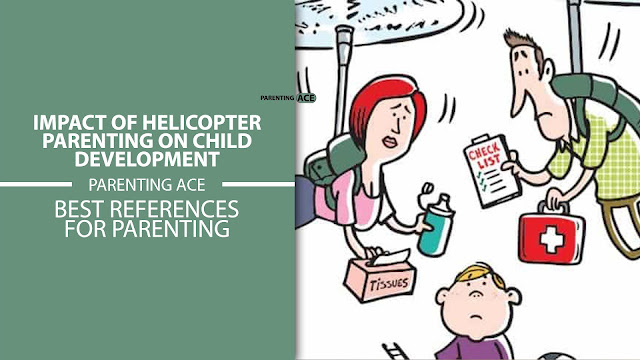Understanding Helicopter Parenting: The Impact on Child Development
In today's fast-paced world, the concept of helicopter parenting has garnered increasing attention and concern among psychologists, educators, and parents alike. Helicopter parenting, characterized by excessive hovering and overprotectiveness, has emerged as a prevalent parenting style with potential implications for children's development. In this blog post, we delve into the phenomenon of helicopter parenting, exploring its defining characteristics, underlying causes, and the impact it can have on children's autonomy, resilience, and overall well-being. Join us as we unravel the complexities of helicopter parenting and examine strategies for fostering healthy parent-child relationships and promoting children's independence and growth.
 |
| Impact Of Helicopter Parenting On Child Development |
What Is Helicopter Parenting?
Helicopter parenting has become a prevalent topic of discussion in modern parenting circles, characterized by an overbearing and excessively involved approach to child-rearing. This phenomenon, often stemming from well-meaning intentions, has raised concerns among psychologists and child development experts due to its potential impact on children's autonomy, resilience, and overall well-being. In this article, we delve into the concept of helicopter parenting, its underlying causes, manifestations, and the long-term effects it may have on children's development.
Defining Helicopter Parenting
Helicopter parenting refers to a style of parenting marked by excessive hovering, overprotectiveness, and micromanaging of a child's life. Parents who exhibit this behavior tend to be overly involved in their children's activities, decision-making processes, and daily routines, often to the detriment of the child's independence and self-reliance. While the term "helicopter parenting" may evoke images of parents constantly hovering overhead, it encompasses a broader spectrum of behaviors that inhibit a child's ability to explore, learn from mistakes, and develop crucial life skills.
Manifestations and Characteristics
Helicopter parenting can manifest in various ways, including closely monitoring a child's academic performance, controlling their social interactions, and shielding them from failure or disappointment. These parents may excessively intervene in conflicts with peers or authority figures, micromanage homework assignments, and orchestrate every aspect of their child's extracurricular activities. Additionally, helicopter parents often struggle to set boundaries, prioritize their child's desires over their needs, and exhibit high levels of anxiety and fear regarding their child's safety and success.
Underlying Causes
Several factors contribute to the emergence of helicopter parenting, including societal pressures, parental anxiety, and cultural influences. In today's hypercompetitive world, parents may feel compelled to ensure their child's success by micromanaging their lives and shielding them from failure at all costs. Moreover, the pervasive influence of social media and the desire to portray an idealized image of parenthood can exacerbate feelings of inadequacy and drive parents to overcompensate by becoming overly involved in their child's affairs.
Impact on Child Development
While helicopter parenting may stem from a place of love and concern, research suggests that it can have detrimental effects on children's development. By depriving children of opportunities to make decisions, solve problems, and learn from failure, helicopter parents hinder the development of essential life skills such as resilience, self-confidence, and autonomy. Children raised in an environment of constant surveillance and control may struggle to assert themselves, cope with adversity, and navigate challenges independently. Moreover, excessive parental involvement can strain the parent-child relationship, leading to feelings of resentment, rebellion, or emotional detachment.
In conclusion, helicopter parenting represents a well-intentioned yet misguided approach to child-rearing that can have profound implications for children's development. While parents may seek to protect their children from harm and ensure their success, excessive hovering and micromanaging can hinder the development of crucial life skills and undermine children's confidence and self-esteem. As psychologists and child development experts, it is essential to raise awareness about the potential pitfalls of helicopter parenting and advocate for a balanced approach that fosters children's autonomy, resilience, and emotional well-being. By empowering parents to strike a healthy balance between support and autonomy, we can cultivate environments that nurture children's growth, independence, and overall flourishing.



Comments
Post a Comment